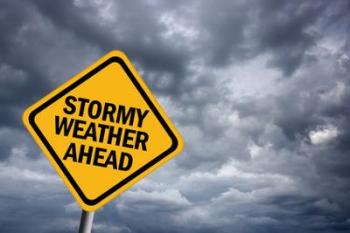Let me set the stage. You’re planning a 5-day conference for your key constituents, your company’s high level executives and their guests. You have this incredible vision—the attendees are commingling at one of the world’s most desired destinations, your welcome reception kicks off the week’s activities at a tropical outdoor venue. Palm trees gently sway in the wind and warm balmy sea breezes blow as your smiling guests enjoy scrumptious indigenous food, drink and music.
For the days following the welcome reception, you’ve planned an informative plenary, constructive breakout sessions and a sensational variety of leisure activities and excursions—ones that your guests will thoroughly enjoy such as floating down a rippling river, sailing on the turquoise sparking sea, zip lining through the dewy rain forest and riding on horseback through the area’s majestic mountain ranges.
But then, Mother Nature, foreboding and unpredictable comes round and whacks you out of your event planning reverie. You’ve got to prepare for her potential wrath.
Plan B – B for Backup
While warm weather venues are seemingly ideal for destinations, outdoor events and excursions, they still battle precipitation, thunderstorms, strong winds, oppressive heat—and even hurricanes. We know you don’t want to think about the “what if” scenario, but it is in everyone’s best interest and safety to do so. Accounting for the instability of weather is a key factor in executing a successful outcome.
As event planners, we deal with all different types of potential conditions and must take key steps to ensure a safe, fun event that coincides with the original vision—even if fighting the weather becomes necessary. Plan B does not have to be “Boring,” but the plan B conversation should happen in advance—and preferably at the onset of planning.
Here are some tips…
Be proactive. Consider how weather may threaten your event during the planning stages. Most venues have a backup indoor option and it’s best to reserve it at the same time that you book your outdoor location. Check availability and be sure to include reference to the backup location when negotiating your contract. For optional activities and excursions, know whether they will go off “rain or shine” and know the cancellation and weather call policies for each. Be sure to build this timing into your production schedule so you don’t miss an opportunity to cancel at no charge.
Know if you’ll proceed in bad weather. As long as you modify your plans sufficiently to ensure your event is safe, you can proceed in inclimate weather. High winds, wet dance areas, outdoor electrical sources that are not under safe cover should all weigh into a smart weather call. If you do decide to proceed, consider purchasing or renting items that will ensure your guests are as comfortable as possible (ponchos, shawls, space heaters, etc.). Build this contingency into your event budget.
Know the costs. We’re always paying attention to the bottom line—and our clients are as well. Know in advance the costs or potential losses associated with canceling, moving or postponing your event versus going forward. This financial information will be very helpful in making borderline decisions. It’s not always about the bottom line, however. Consider the optics. Sometimes, losing a little money is better than the leaving your attendees with a lingering bad memory.
How do you make the call? Making a weather call can be tricky. Sometimes skies are blue early in the day, but major storms threaten to hit during your event. You need to decide if it’s safe, fiscally smart and worth proceeding. Ultimately, the decision is up to the client, but we will monitor a variety of weather sites and counsel our clients on the overall outlook with regard to safety, practicality and comfort.
Who will make the call? It takes one person or small team with confidence in their decision making abilities. Making a weather call is sometimes unpopular, so it is important that all decision makers agree to support each other on the final decision. If more than one person is assigned to the weather call team, when and where will you meet to reach a decision? Once the call has been made, have a list of who will be notified—and how they will be notified—at your fingertips.
When will you make the call? The night before? The morning of? Three hours before? Your timeline for making a weather call will depend upon the contracts you’ve signed. When the decision is actually made ultimately depends on the event setup timing. The venue you are working with typically has a set weather call schedule, but be sure you’re on top of it.
Monitor the Weather. There are some great weather monitoring sites that can help you make the best weather call possible. Sites range from giving you minute-to-minute or daily updates while others can help you choose an optimal event date up to two years in advance. There is even “Big Day” weather site that you can subscribe to that will keep you and your guests updated on weather up to 168 days in advance of your event.
Final Tip. Keep your guests informed—they will be asking!
Plan C – C for Cancel
Sometimes Mother Nature forces us to choose Plan C – Cancel. Canceling an event can be very uncomfortable, unnerving—and even tumultuous at times. But so is standing outside in a hurricane…
Below are some weather monitoring sites that may be helpful to you.
www.weather.com
www.accuweather.com
www.wunderground.com
www.theweatherwiz.com (long-range weather app helps you pick an event date up to two years out)
www.bigdayweather.com (subscription-based)
www.eventweatherplan.com (subscription-based)
Disclaimer: Mother Nature
















